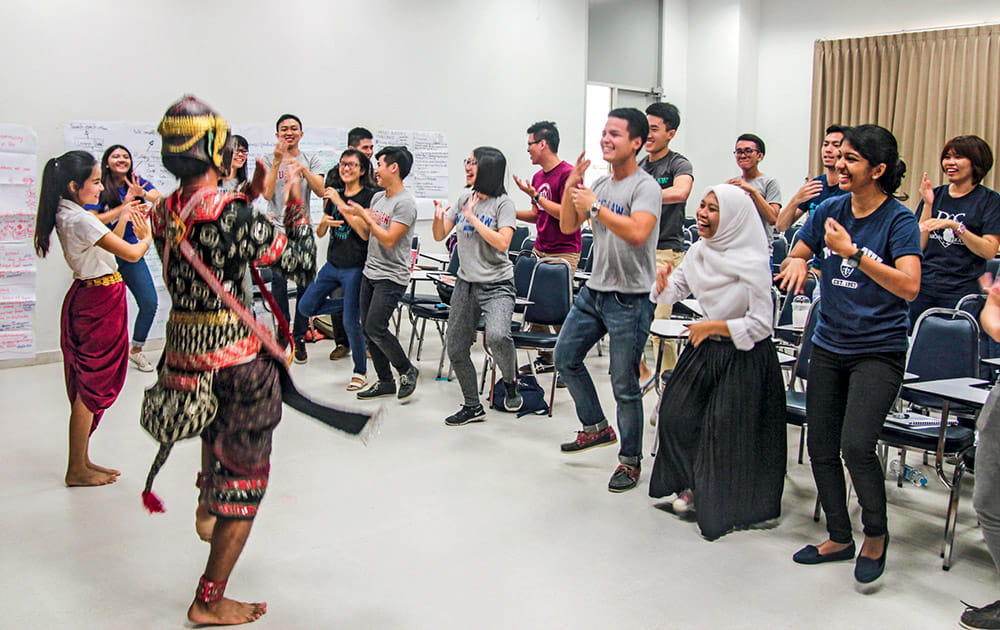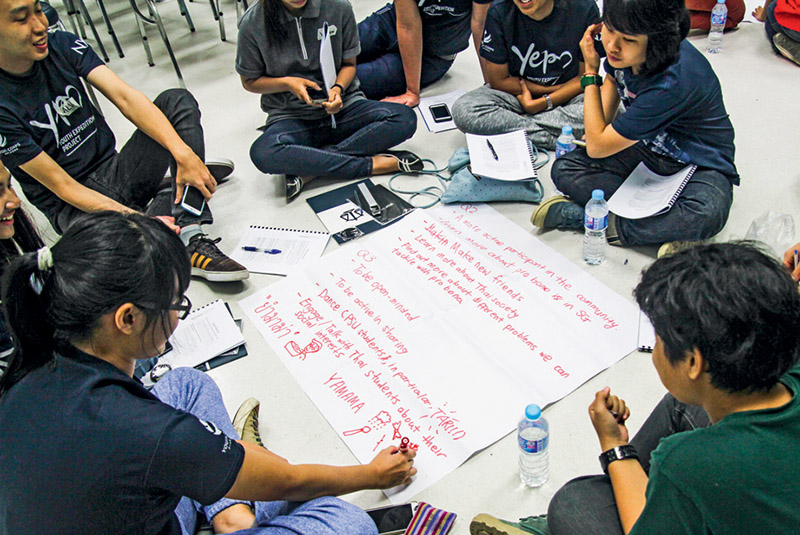Stories > Raising The Bar
Raising The Bar
Thai-Ed With Love, a partnership between universities in Singapore and Thailand, cultivates a pro bono culture among future legal eagles.
BY DESMOND NG
PHOTOS THAI-ED WITH LOVE

NUS students learning a cultural dance from students of the Prince of Songkla University.
imi Mie, a law undergraduate at the Prince of Songkla University in Hat Yai, southern Thailand, used to feel a sense of helplessness when it came to helping solve the legal issues faced by the underprivileged in her country.
This changed after she took part in Thai- Ed With Love, a programme developed by the National University of Singapore (NUS) Pro Bono Group and their counterparts in Thai universities. Inspired by a group of NUS law students, she went on to start her own pro bono group to help the needy.
The NUS Pro Bono Group is a student-run organisation dedicated to promoting pro bono work among the university’s law students. In 2014, it met law students from Thailand’s Khon Kaen University at a pro bono conference in Singapore. The two groups decided to form Thai- Ed With Love to promote a pro bono culture and facilitate the exchange of information between students about the projects in their respective communities.
The inaugural Thai-Ed With Love project, held in north-east Thailand in January 2015, brought together close to 250 law students and professors from NUS, Khon Kaen University and Thammasat University in Bangkok.
Through discussions, presentations and field trips, the 2015 project succeeded in raising awareness of various issues that plague Thailand, such as human trafficking and domestic violence against foreign women. The students also worked together on two community legal education programmes which targeted at-risk youth and Thai migrant workers.
“The biggest gain from (Thai-Ed With Love) is the friendships that I have made. It provides a platform for the exchange of ideas, and paves the way for future collaborations.”
Lim Wei Yang, NUS law student
In January this year, the collaboration continued with over 100 participants from four tertiary institutions from Singapore and Thailand. They included a group of 18 law students and two lecturers from NUS, who travelled to Thailand for the project, as well as students and professors from the Prince of Songkla University, Thammasat University and Chulalongkorn University.
Taking place over nine days, participants were encouraged to think about social issues that they were interested in as well as issues that were of relevance to the local communities.
It was at this session that Aimi, 20, was inspired to make a difference. She says the exposure and interaction with the law undergraduates helped broaden her perspective on how she can help the less privileged. She adds: “My NUS friends taught me that not every problem requires a radical change. If you can help just one in 100 people, it’s good enough.”

Participants setting goals for what they hope to achieve from taking part in the Thai-Ed With Love programme.
UPLIFTING COMMUNITIES
NUS law student Lim Wei Yang says he has gained much from his experience interacting with the Thai students. He says: “The biggest gain from (Thai-Ed With Love) is the friendships that I have made. It provides a platform for the exchange of ideas, and paves the way for future collaborations.”
So far, the project has led to students in the Prince of Songkla University, Thammasat University as well as Khon Kaen University setting up their own pro bono groups to help the less fortunate in their respective communities.
NUS law student Shawn Teo, who was the project director of Thai-Ed With Love 2016, says: “The students can use these experiences to build a stronger network and pro bono landscape, and eventually use the legal knowledge they have to serve their communities better.”
He adds that the NUS participants were equally inspired to learn about how students from the Prince of Songkla University had tackled the problem of coastal erosion along a stretch of beach in Songkhla.
The Thai students had shared with them that the installation of power plants, breakwaters and sea walls in recent years had caused the shoreline to recede significantly. It had a negative impact on the communities living near the shore and also affected the tourism industry.
Teo says: “They shared how they assembled all the evidence and even went to court to explain the problem to the judge. It was truly very inspiring for all the participants!”
